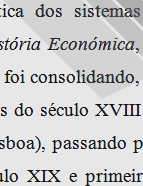

................................
He is one of the greatest figures of Portuguese culture in the 20th century, particularly noted for his essays, literature, philosophy, concerns with education - especially civic education -, pedagogy, cooperativism, and critical interpretation of Portuguese history. He authored a vast and diverse body of work. As his life and work have already been discussed in more detail (José Amado Mendes, "A renovação da historiografia portuguesa" ["The Renewal of Portuguese Historiography"], 1996, pp. 277-284), the intention here is to emphasise his contribution to the interpretation of Portuguese history. He enhanced the importance of geographical conditions, as well as socioeconomic factors for the country's development. He strongly criticised the emphasis given to the "transport policy" over the "settlement policy", or in other words, the dominance of commerce over production. In his Breve interpretação da História de Portugal [Brief Interpretation of Portuguese History] (which was highly successful shortly after its first edition in 1972), Sérgio asserted that "all the wealth of the East only passed through Portugal, and promoted foreign labour, which provided us with all things" (António Sérgio, Breve interpretação da História de Portugal, 1974, p. 96). In the author's view, history had an instrumental significance; it was not an end in itself but a means to "forge spirits that construct the future" (Id., Idem, p. 1). Within the Faculty of Letters of the University of Lisbon, during the period under review and concerning economic history, Virgínia Rau and Jorge Borges de Macedo were prominent figures. Virgínia de Bivar Robertes Rau (1907-1973). As already noted, V. Rau "had the great merit of engaging with and drawing the attention of her students and collaborators to themes of economic and social history, generally overlooked by erudite historiography" (Oliveira Marques, Antologia [Anthology]..., vol. I, 1974, p. 50). She completed her secondary school studies in Lisbon, then enrolled at the Faculty of Letters. In 1928, she interrupted her studies and travelled abroad (Germany and France), where she attended courses and conducted historical research in libraries and archives, allowing her to engage with the emerging trends in historiography through the new history movement. She returned to Portugal in 1939, ultimately obtaining her bachelor and doctoral degrees - in History and Philosophy of Science- from the Faculty of Letters of the University of Lisbon in 1943 and 1947, respectively, with distinction. In addition to teaching at this Faculty, she delivered courses, lectures, and conducted research in various countries (including the United States, Brazil, France, England, Germany, and Italy), thereby achieving significant international recognition.
